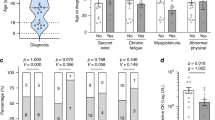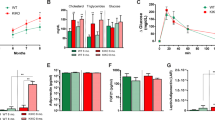Abstract
Lipid storage myopathy (LSM) is a heterogeneous group of lipid metabolism disorders predominantly affecting skeletal muscle by triglyceride accumulation in muscle fibers. Riboflavin therapy has been shown to ameliorate symptoms in some LSM patients who are essentially concerned with multiple acyl-CoA dehydrogenation deficiency (MADD). It is proved that riboflavin responsive LSM caused by MADD is mainly due to ETFDH gene variant (ETFDH-RRMADD). We described here a case with riboflavin responsive LSM and MADD resulting from FLAD1 gene variants (c.1588 C > T p.Arg530Cys and c.1589 G > C p.Arg530Pro, FLAD1-RRMADD). And we compared our patient together with 9 FLAD1-RRMADD cases from literature to 106 ETFDH-RRMADD cases in our neuromuscular center on clinical history, laboratory investigations and pathological features. Furthermore, the transcriptomics study on FLAD1-RRMADD and ETFDH-RRMADD were carried out. On muscle pathology, both FLAD1-RRMADD and ETFDH-RRMADD were proved with lipid storage myopathy in which atypical ragged red fibers were more frequent in ETFDH-RRMADD, while fibers with faint COX staining were more common in FLAD1-RRMADD. Molecular study revealed that the expression of GDF15 gene in muscle and GDF15 protein in both serum and muscle was significantly increased in FLAD1-RRMADD and ETFDH-RRMADD groups. Our data revealed that FLAD1-RRMADD (p.Arg530) has similar clinical, biochemical, and fatty acid metabolism changes to ETFDH-RRMADD except for muscle pathological features.
This is a preview of subscription content, access via your institution
Access options
Subscribe to this journal
Receive 12 print issues and online access
$259.00 per year
only $21.58 per issue
Buy this article
- Purchase on Springer Link
- Instant access to full article PDF
Prices may be subject to local taxes which are calculated during checkout



Similar content being viewed by others
Data availability
Additional data and material are available upon request.
References
Bruno C, Dimauro S. Lipid storage myopathies. Curr Opin Neurol. 2008;21:601–6.
Liang WC, Nishino I. Lipid storage myopathy. Curr Neurol Neurosci Rep. 2011;11:97–103.
Fryburg JS, Pelegano JP, Bennett MJ, Bebin EM. Long-chain 3-hydroxyacyl-coenzyme A dehydrogenase (L-CHAD) deficiency in a patient with the Bannayan-Riley-Ruvalcaba syndrome. Am J Med Genet. 1994;52:97–102.
Tein I, Elpeleg O, Ben-Zeev B, Korman SH, Lossos A, Lev D, et al. Short-chain acyl-CoA dehydrogenase gene mutation (c.319C>T) presents with clinical heterogeneity and is candidate founder mutation in individuals of Ashkenazi Jewish origin. Mol Genet Metab. 2008;93:179–89.
Nilipour Y, Fatehi F, Sanatinia S, Bradshaw A, Duff J, Lochmuller H, et al. Multiple acyl-coenzyme A dehydrogenase deficiency shows a possible founder effect and is the most frequent cause of lipid storage myopathy in Iran. J Neurol Sci 2020;411:116707.
Lepori V, Muhlhause F, Sewell AC, Jagannathan V, Janzen N, Rosati M, et al. A Nonsense Variant in the ACADVL Gene in German Hunting Terriers with Exercise Induced Metabolic Myopathy. G3 (Bethesda). 2018;8:1545–54.
Wen B, Dai T, Li W, Zhao Y, Liu S, Zhang C, et al. Riboflavin-responsive lipid-storage myopathy caused by ETFDH gene mutations. J Neurol Neurosurg Psychiatry. 2010;81:231–6.
Olsen RK, Olpin SE, Andresen BS, Miedzybrodzka ZH, Pourfarzam M, Merinero B, et al. ETFDH mutations as a major cause of riboflavin-responsive multiple acyl-CoA dehydrogenation deficiency. Brain. 2007;130:2045–54.
Wen B, Tang S, Lv X, Li D, Xu J, Olsen RKJ, et al. Clinical, pathological and genetic features and follow-up of 110 patients with late-onset MADD: a single-center retrospective study. Hum Mol Genet. 2022;31:1115–29.
Grunert SC. Clinical and genetical heterogeneity of late-onset multiple acyl-coenzyme A dehydrogenase deficiency. Orphanet J Rare Dis. 2014;9:117.
Bosch AM, Abeling NG, Ijlst L, Knoester H, van der Pol WL, Stroomer AE, et al. Brown-Vialetto-Van Laere and Fazio Londe syndrome is associated with a riboflavin transporter defect mimicking mild MADD: a new inborn error of metabolism with potential treatment. J Inherit Metab Dis. 2011;34:159–64.
Schiff M, Veauville-Merllie A, Su CH, Tzagoloff A, Rak M, Ogier de Baulny H, et al. SLC25A32 mutations and riboflavin-responsive exercise intolerance. N. Engl J Med. 2016;374:795–7.
Mosegaard S, Bruun GH, Flyvbjerg KF, Bliksrud YT, Gregersen N, Dembic M, et al. An intronic variation in SLC52A1 causes exon skipping and transient riboflavin-responsive multiple acyl-CoA dehydrogenation deficiency. Mol Genet Metab. 2017;122:182–8.
Foley AR, Menezes MP, Pandraud A, Gonzalez MA, Al-Odaib A, Abrams AJ, et al. Treatable childhood neuronopathy caused by mutations in riboflavin transporter RFVT2. Brain. 2014;137:44–56.
Nimmo GAM, Ejaz R, Cordeiro D, Kannu P, Mercimek-Andrews S. Riboflavin transporter deficiency mimicking mitochondrial myopathy caused by complex II deficiency. Am J Med Genet A. 2018;176:399–403.
Al Shamsi B, Al Murshedi F, Al Habsi A, Al-Thihli K. Hypoketotic hypoglycemia without neuromuscular complications in patients with SLC25A32 deficiency. Eur J Hum Genet. 2022;30:976–9.
Olsen RKJ, Konarikova E, Giancaspero TA, Mosegaard S, Boczonadi V, Matakovic L, et al. Riboflavin-responsive and -non-responsive mutations in FAD synthase cause multiple acyl-CoA dehydrogenase and combined respiratory-chain deficiency. Am J Hum Genet. 2016;98:1130–45.
Mereis M, Wanders RJA, Schoonen M, Dercksen M, Smuts I, van der Westhuizen FH. Disorders of flavin adenine dinucleotide metabolism: MADD and related deficiencies. Int J Biochem Cell Biol. 2021;132:105899.
Yildiz Y, Olsen RKJ, Sivri HS, Akcoren Z, Nygaard HH, Tokatli A. Post-mortem detection of FLAD1 mutations in 2 Turkish siblings with hypotonia in early infancy. Neuromuscul Disord. 2018;28:787–90.
Ryder B, Tolomeo M, Nochi Z, Colella M, Barile M, Olsen RK, et al. A novel truncating FLAD1 variant, causing multiple acyl-CoA dehydrogenase deficiency (MADD) in an 8-year-old boy. JIMD Rep. 2019;45:37–44.
Auranen M, Paetau A, Piirila P, Pohju A, Salmi T, Lamminen A, et al. Patient with multiple acyl-CoA dehydrogenation deficiency disease and FLAD1 mutations benefits from riboflavin therapy. Neuromuscul Disord. 2017;27:581–4.
Lee YJ, Kim SY, Kim MJ, Kim AR, Lee JM, Chae JH. Infant with early onset bilateral facial and bulbar weakness: Successful treatment of riboflavin in multiple acyl-CoA dehydrogenase deficiency caused by biallelic nonsense FLAD1 variants. Neuromuscul Disord. 2021;31:1194–8.
Vengalil S, Polavarapu K, Preethish-Kumar V, Nashi S, Arunachal G, Chawla T, et al. Mutation spectrum of primary lipid storage myopathies. Ann Indian Acad Neurol. 2022;25:106–13.
Muru K, Reinson K, Kunnapas K, Lillevali H, Nochi Z, Mosegaard S, et al. FLAD1-associated multiple acyl-CoA dehydrogenase deficiency identified by newborn screening. Mol Genet Genom Med. 2019;7:e915.
Yamada K, Ito M, Kobayashi H, Hasegawa Y, Fukuda S, Yamaguchi S, et al. Flavin adenine dinucleotide synthase deficiency due to FLAD1 mutation presenting as multiple acyl-CoA dehydrogenation deficiency-like disease: A case report. Brain Dev. 2019;41:638–42.
Garcia-Villoria J, De Azua B, Tort F, Mosegaard S, Ugarteburu O, Texido L, et al. FLAD1, encoding FAD synthase, is mutated in a patient with myopathy, scoliosis and cataracts. Clin Genet. 2018;94:592–3.
Aguilar-Recarte D, Barroso E, Guma A, Pizarro-Delgado J, Pena L, Ruart M, et al. GDF15 mediates the metabolic effects of PPARbeta/delta by activating AMPK. Cell Rep. 2021;36:109501.
Laurens C, Parmar A, Murphy E, Carper D, Lair B, Maes P, et al. Growth and differentiation factor 15 is secreted by skeletal muscle during exercise and promotes lipolysis in humans. JCI Insight. 2020;5:e131870.
Acknowledgements
The authors are grateful to the patient and his families for their participation. This work was supported by the National Natural Science Foundation of Shandong Province (No.ZR2023MH229), the National Natural Science Foundation of China (No.82071412); the Youth Program of National Natural Science Foundation of China (81701058, 81901278); National Key Research and Development Program of China (2021YFC2700904); Qingdao Technology Program for Health and Welfare (20–3-4–42-nsh); the Taishan Scholars Program of Shandong Province.
Author information
Authors and Affiliations
Corresponding authors
Ethics declarations
Competing interests
The authors declare no competing interests.
Informed consent
The study was approved by the Ethics Committee of Qilu Hospital, Shandong University (number: KYLL-202208-024). Informed consent was obtained from all patients for being included in the study.
Additional information
Publisher’s note Springer Nature remains neutral with regard to jurisdictional claims in published maps and institutional affiliations.
Rights and permissions
Springer Nature or its licensor (e.g. a society or other partner) holds exclusive rights to this article under a publishing agreement with the author(s) or other rightsholder(s); author self-archiving of the accepted manuscript version of this article is solely governed by the terms of such publishing agreement and applicable law.
About this article
Cite this article
Wen, B., Tang, R., Tang, S. et al. A comparative study on riboflavin responsive multiple acyl-CoA dehydrogenation deficiency due to variants in FLAD1 and ETFDH gene. J Hum Genet 69, 125–131 (2024). https://doi.org/10.1038/s10038-023-01216-3
Received:
Revised:
Accepted:
Published:
Issue Date:
DOI: https://doi.org/10.1038/s10038-023-01216-3



